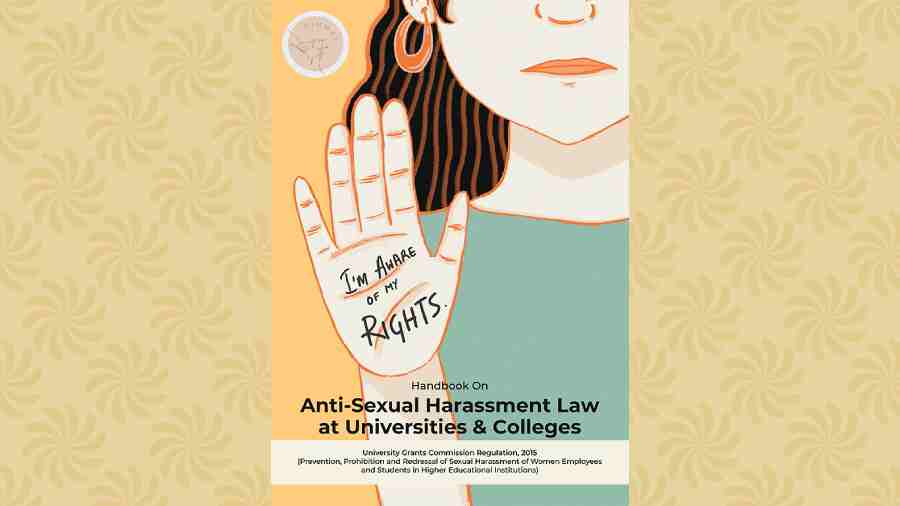When a case of sexual harassment filed by a student in their college dragged for two years without a definite result, Sreeja Sengupta and Megha Rana Ray took up the cudgels.
“We realised how little awareness there was about how such cases should be pursued. And if this was the state at a law college, imagine the ignorance on other campuses!” says Sreeja.
The girls, both final year students of West Bengal National University of Juridical Sciences (NUJS), thus began researching the laws and formed Himmat, a movement comprising students as volunteers and advocates and experts as consultants.
“We have come out with a handbook on anti-sexual harassment laws in colleges and universities based on the University Grants Commission (UGC) Regulation, 2015. It is in straightforward language so non-law students can follow. Knowing the law is the first step to empowering students,” says Megha, a resident of New Town’s Sankalpa 3.
“We are offering free legal aid to victims and creating awareness across colleges by speaking to their student bodies,” adds Sreeja, who lives in GD Block.

Here are some pointers from the handbook, that can be downloaded from safecollegespace.com:
A classmate was watching pornography on his phone and kept it in front of me to watch. It made it uncomfortable. Can I complain about this?
You can and you must. Sexual harassment covers any incident where a person behaves in an unwanted sexual manner that makes a survivor uncomfortable, creating an environment that is not conducive to a healthy or safe work place.
Harassment includes unwelcome physical contact and advances, showing pornography, making sexually-coloured remarks, sexting, making requests for sexual favours in return for something etc. The laws are gender-neutral and encompass the LGBTQ+ community. So a homophobic slur counts as harassment too.
And not just students, the laws protect professors, office-staff or even, say, a student attending a fest at your college.
My senior kissed me out of the blue. I was too stunned to react. But since I didn’t stop him, he says he did no wrong.
For any sexual act there must be consent from the persons involved and the consent must be positive in nature. It cannot be presumed. The lack of resistance is not consent. Consent must be actively and continuously given throughout the sexual activity.
For instance, consenting to holding hands does not mean one wants to be kissed. Consenting to kiss does not mean one wants to go further. Also, consent can be revoked at any time during or before the sexual act and consent given under the influence of alcohol is not valid.
Should I go to the cops with my complaints?
You can, but there is an easier way out for college students. The police rarely take such cases seriously. They’ll ask the plaintiff and accused to solve the issue mutually. They’ll ask the plaintiff why she/he is filing a case when they are friends. Going to the police takes time, money, energy and it’s all public. The entire court proceedings are free for all to watch and details will be uploaded on the internet. And you’ll be lucky if the case is disposed in less than five years.
So what should I do?
Every college under UGC must have an “internal committee” whose job it is to receive and address complaints of sexual harassment. It comprises a presiding officer who shall be a woman faculty member employed at a senior level, two faculty members and two non-teaching employees committed to the cause of women or with experience in social work or legal knowledge. If the matter involves students, the committee must have three student members and one external member from an NGO or with experience in issues of sexual harassment etc.
But keep in mind, that the complaint must be filed, by and large, within three months of the incident.
What will the internal committee do?
It will send a copy of the complaint to the respondent, who must reply along with evidence and witnesses. There will be an inquiry with written or oral testimony by both parties and witnesses, cross-examination etc. The inquiry must be completed within 90 days. All the while they will keep the identity of the aggrieved party, respondent and witnesses confidential.
How will the committee punish the perpetrator?
The committee will offer conciliation, in case both parties want to agree to an acceptable solution. This could be a written apology, counselling, a bond of good conduct, assurance to maintain distance from the complainant etc. However, it cannot include any monetary settlement.
In case the parties do not agree on conciliation, and a full-fledged inquiry finds the accused guilty, the punishment will vary depending on the offence. He may have to perform community service or be stripped of privileges like scholarship, hostel facilities, transportation or even be suspended or expelled. There is also provision for monetary compensation for the mental trauma, any loss of career opportunity, medical expenses including psychiatric treatment borne by the complainant etc.
Write to us at saltlake@abp.in
